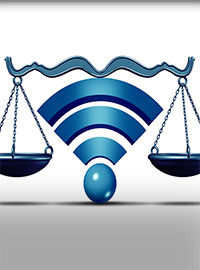| FCC and Chairman Ajit Pai Vindicated on "Net Neutrality" by Court, Experience |
 |
|
By Timothy H. Lee
Thursday, October 08 2020 |
Remember the so-called “Net Neutrality” debate? In fairness, Americans shouldn’t be blamed for cleansing it from their minds. Its Orwellian name alone offended any sense of logic, considering that a heavy-handed, 1930s-era, crony-capitalist, utility-style, interventionist federal regulation of internet service was anything but “neutral.” Additionally, the tiresome doomsday predictions from pro-regulation advocates made it a particularly forgettable episode. Recent events, however, return it to the fore and reconfirm the importance of a deregulatory, light-touch governmental approach to internet service. Specifically, the Federal Communications Commission (FCC) under Chairman Ajit Pai won a significant victory in the nation’s second-highest court, when the D.C. Circuit Court of Appeals upheld restoration of the bipartisan, light-touch deregulatory stance that prevailed between 1996 and 2015 until the Obama Administration’s FCC unreasonably decided to impose heavy top-down internet regulation under the false name “Net Neutrality.” In addition to that legal victory, real-world facts amid a societally disruptive coronavirus pandemic confirm the soundness of their approach. For that, all Americans can be thankful for the FCC’s 2017 wisdom in restoring the light-touch regulatory approach to internet service. The internet blossomed inexorably from 1996 through 2015 because the federal government through Democratic and Republican administrations took a rational light-touch regulatory approach. That gave innovators the latitude that they needed to experiment, try different approaches and cultivate internet service to what we now enjoy. Suddenly, with no basis other than placating its crony capitalist benefactors, the Obama Administration decided in 2015 that what the internet needed was heavy-handed “Net Neutrality” regulation modeled on 1930s-style copper wire telephone laws. The immediate results were disastrous. For the first time outside of an economic recession, private broadband investment actually declined. Accordingly, in 2017 the new FCC under Chairman Pai passed the Restoring Internet Freedom Order, restoring to the deregulatory approach that prevailed for two decades prior to 2015. As referenced above, latenight comedians and far-left regulatory fetishists predicted doom. They literally alleged that people would die, that tweets would suddenly cost $5 apiece, that people would access the internet one word at a time and that internet service as we know it would collapse. As Chairman Pai himself neatly summarized, however, the exact opposite occurred: And what’s been the result? The Internet has remained free and open. And it’s stronger than ever. Millions more Americans have access to the Internet today than in 2017. In 2018 and then again in 2019, the United States set records for annual fiber deployment, and we’ve seen network investment hit levels that our nation hadn’t seen for over a decade. In fact, since we adopted the Restoring Internet Freedom Order, average download speeds for fixed broadband in the Unite States have doubled, increasing by over 99% (so much for getting the Internet one word at a time). And in 2018 and 2019, we added over 72,000 wireless cell sites in the United States, after adding fewer than 20,000 in the prior four years. The news gets even better as it relates to internet service following the coronavirus pandemic and its sudden disruptions. Namely, the nation’s networks have held up extremely well throughout the pandemic despite immense usage shifts and capacity demands. In fact, average internet speeds have actually increased over the past six months in America. Meanwhile, other nations with more interventionist regulatory approaches have been forced to throttle consumer usage following years of comparatively inferior infrastructure investment. While doomsayers’ predictions thus proved flatly incorrect, their attempted legal assault fared no better. Despite pro-regulation activists’ expectations of success, the D.C. Circuit Court of Appeals affirmed the Restoring Internet Freedom Order and only asked for FCC clarification on three minor issues. This week, Chairman Pai circulated an order for consideration in response to those questions. Among other items, Chairman Pai is also circulating rules to establish a 5G fund for rural America, which will distribute up to $9 billion to extend 5G service to rural areas that would otherwise be unlikely to achieve deployment. He is also proposing changes to expand use of “white space” airwaves to provide broadband coverage in rural and unserved areas while maintaining protections for television broadcasters. All of this serves to again highlight the importance of free markets and a light-touch regulatory approach for the internet sector. After a brief hiccup when the Obama FCC irresponsibly increased regulation in 2015, the deregulatory stance that allowed the internet to grow between 1996 and 2015 also prepared the United States to handle the unexpected coronavirus demands as well as we have. For that, Americans should be thankful, and support continuation of that market-based approach as the importance of the internet economy only increases. |
Related Articles : |
























